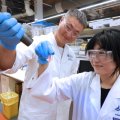A University of Queensland researcher has been recognised as a future leader in medical research for his groundbreaking work on understanding the biological basis of disease to develop new treatment options.
Australian Society for Medical Research President Dr Richard Clark presented the Senior Researcher Award for 2013 to UQ’s School of Biomedical Sciences Dr Trent Woodruff.
Dr Clark said Dr Woodruff is doing revolutionary work on the role of the C3a receptor in neutrophil mobilisation, a process by which white blood cells move out of the bone marrow into the bloodstream.
“This award is a reflection of scientific excellence and recognises Dr Woodruff as one of Queensland’s future leaders in health and medical research," Dr Clark said.
“This type of research focuses on new modes of disease prevention as well as making advances in understanding the biological basis of disease and the development and testing of new treatments.”
Dr Woodruff’s research concentrates on the complement system, an integral component of the body’s immune defence against pathogens, but can lead to tissue injury if uncontrolled.
A major component of this system is the complement factor C3a, which through its receptor, is involved in inflammatory diseases such as sepsis, trauma and heart attack.
The study found that the C3a receptor is essential in reducing the number of white blood cells available to attack damaged tissues.
Dr Woodruff said injuries were reduced when a potent C3a drug mimic was administered.
“This research revealed new novel drug candidates which may be useful in treating traumatic injuries typically arising from car accidents, such as crush injuries and spinal cord injuries, ” Dr Woodruff said.
The work is published in The Proceedings of the National Academy of Sciences, USA.
The Health and Medical Research Awards are presented annually for outstanding research contributions in all areas of health-related research across Queensland.
The Australian Society for Medical Research is committed to fostering excellence in health and medical research and promoting community understanding and support for medical research.
Media: UQ School of Biomedical Sciences, Avril Johnston-Craig, 07 3365 1536, 0408 160 784, a.johnstoncraig@uq.edu.au
About the School of Biomedical Science
The School of Biomedical Sciences has a strong history of scientific education and research programs. The School’s mission is to create world-class biomedical scientists, and contribute to the development of world-class health and allied health professionals through excellence in teaching and research.
.jpg)









